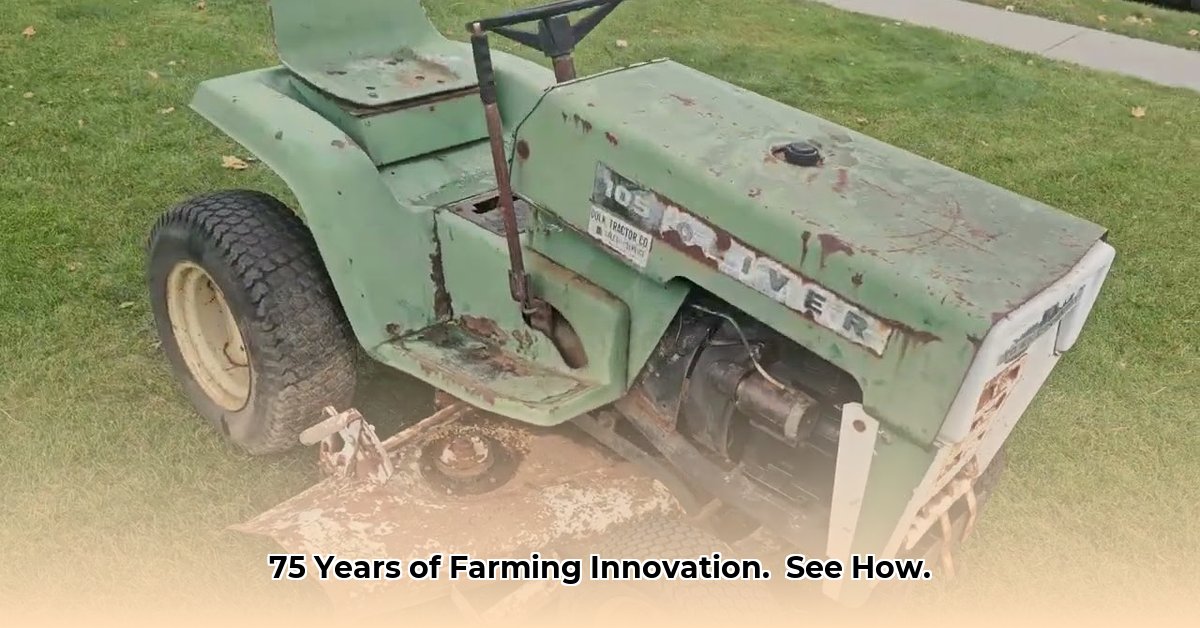
From Humble Beginnings to Industry Leader: The Dolk Tractor Story
Dolk Tractor Company, a Sacramento River Delta institution, celebrates 75 years of success in the agricultural equipment sector. Initially a small Oliver Tractor dealership, Dolk has evolved into a multifaceted enterprise representing brands like Kubota, Versatile, White, Hesston, Ford, and New Holland. This growth trajectory highlights the company's strategic adaptations and long-term vision within the dynamic landscape of sustainable agriculture. How has Dolk Tractor's strategic decision-making fueled its remarkable success? The answer lies in a blend of calculated acquisitions, a family-focused ownership structure, and a proactive approach to risk management. Learn more about different tractor uses.
A Strategic Approach to Growth: Smart Acquisitions, Not Just Chance
Dolk Tractor's impressive brand portfolio wasn't built through random acquisitions; it reflects a keenly developed understanding of market trends and evolving farming needs. The addition of Kubota, with its focus on smaller, fuel-efficient tractors, perfectly aligned with the demands of the Sacramento River Delta's specialized farming operations. Similarly, the integration of New Holland's construction equipment broadened their customer base and diversified their offerings, demonstrating a strategic awareness of the interconnectedness between agriculture and supporting infrastructure. This targeted growth strategy speaks to a deep understanding of the market. Did this success stem from calculated risk-taking, or an innate ability to anticipate market needs? The company's consistent growth over 75 years strongly suggests a blend of both foresight and strategic execution. This approach clearly demonstrates how strategic diversification can strengthen a company’s position in a competitive market.
Family Matters: The Heartbeat of Dolk Tractor
For four generations, the Dolk family has provided consistent leadership, fostering deep relationships with both customers and the local community. Family ownership isn't simply a business model for Dolk—it’s a core aspect of their identity, building a reputation based on enduring partnerships rather than fleeting transactions. This long-term perspective contrasts sharply with the short-term profit-driven approaches often seen in larger corporations. What impact has this family-focused approach had on their long-term success? The answer lies in the strong relationships they have built both within their community and across their customer base.
Navigating the Challenges: A Proactive Risk Management Approach
Dolk Tractor's success is not solely attributable to fortunate circumstances; it’s also the result of a proactive approach to risk management. The company has identified and created mitigation strategies for potential challenges:
| Risk Factor | Potential Impact | Mitigation Strategy |
|---|---|---|
| Dependence on specific brands | Limited product options; supply chain vulnerability | Diversifying partnerships and prioritizing adaptable equipment designs. |
| Shifting farming techniques | Decreased demand for certain equipment | Continuous market research; flexible product offerings; employee training. |
| Economic downturns | Reduced sales and profitability | Diversified customer base; careful financial planning; strong financial reserves. |
| Climate change impact on agriculture | Crop failures; changing farming conditions | Adapting to new crop varieties; prioritizing equipment designed for changing climates. |
This proactive risk assessment demonstrates a commitment to anticipating challenges and strategically positioning the company for long-term success. How has this approach aided Dolk Tractor in weathering economic downturns and adapting to changing market conditions? Their consistent growth over decades provides a compelling answer.
Sustainability: More Than Just a Buzzword
While Dolk Tractor doesn't publicly release a detailed sustainability report, their actions reveal a commitment to responsible practices. The adoption of Kubota's fuel-efficient tractors suggests a long-term focus on environmental stewardship. However, future initiatives could include: investing in precision agriculture technology to optimize resource use, exploring partnerships with companies specializing in eco-friendly equipment, and integrating renewable energy sources into their operations. These steps would further solidify their position as a leader in sustainable agriculture. What additional steps can Dolk Tractor take to enhance their sustainability profile and contribute to a greener future? This is an ongoing journey, requiring continuous innovation and adaptation.
Actionable Recommendations
This case study offers actionable recommendations for stakeholders throughout the sustainable agriculture sector.
For Dolk Tractor:
- Invest in Data-Driven Efficiency: Implementing data analytics can optimize operations and streamline resource management, increasing efficiency and reducing waste.
- Explore Electric/Hybrid Equipment: Transitioning to more environmentally friendly equipment showcases leadership and enhances their sustainability profile.
- Strategic Partnerships: Collaborating with forward-thinking companies focused on sustainable technologies accelerates innovation and expands market reach.
For Customers:
- Embrace Precision Agriculture: Precision farming techniques minimize waste and optimize resource utilization, increasing profitability and sustainability.
- Prioritize Fuel-Efficient Equipment: Choosing fuel-efficient equipment directly reduces environmental impact and operational costs.
- Support Sustainable Agriculture Policies: Supporting policies that promote sustainability benefits both the environment and the long-term health of the agricultural sector.
For Government Agencies:
- Incentivize Sustainable Practices: Providing tax credits and subsidies encourages the adoption of sustainable farming techniques and machinery, accelerating the transition.
- Invest in Research and Development: Funding research and development in climate-resilient agriculture and sustainable technologies fuels innovation for the future.
- Streamline Regulations: Reducing bureaucratic hurdles simplifies the adoption of eco-friendly agricultural solutions, encouraging wider participation.
Conclusion: A Legacy of Adaptation
Dolk Tractor's 75-year success story serves as a compelling case study in the importance of adaptability, responsiveness, and long-term vision within the dynamic field of sustainable agriculture. Their commitment to innovation and collaboration positions them for continued success in the years to come, offering valuable lessons for businesses operating in similar sectors. What is the most crucial takeaway from Dolk Tractor's success story? It's the power of strategic adaptation and a long-term commitment to sustainability.